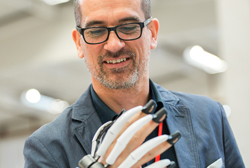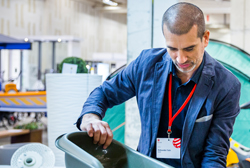“Today, we are surrounded by more design, thus better products, than in the past.”: interview with Red Dot juror Aleks Tatic
At the heart of the Red Dot Award: Product Design is its jury. With their specialist knowledge, about 40 recognised experts from around the world guarantee the high quality standards and thus the value of the Red Dot seal. In the end of February they gathered in order to test, discuss and assess every single entry in an evaluation process lasting several days. In 2017, Aleks Tatic was again part of the expert committee, for whom the role of design in everyday life has changed: “Because companies recognised the competetive factor ‘design’, they are running design more and everywhere.”
Aleks Tatic was born in Cologne and is a product designer and founder of Tatic Designstudio in Milan, Italy. After his studies in the US he specialised in sports and lifestyle products while working in various international agencies in London and Milan. Nowadays he designs and develops – among others – sailing yachts, sporting goods, power tools, FMCGs and consumer electronics for European and Asian premium brands together with his multicultural team of designers and product specialists. Before that, he guided the multiple award-winning Italian design studio Attivo Creative Resource to international success, leading the agency for 12 years. Aleks Tatic lectures practice-oriented industrial design and innovation management at various European universities and seminars. In an interview with Red Dot, the design expert explains among others the importance of design for the economic success of companies.
Red Dot: Has the role of design in our everyday life changed?
Aleks Tatic: At university, we were taught that product design would have the task to improve the lives and work of the people. The economic success of a company would emerge as a by-product. Meanwhile, a role reversal took place: Today, the designers primarily design for the economic success of products and companies. And sometimes, a product comes out alongside that improves our lives. I do not see this negatively: By recognising the competitive factor of design, design is operated more and everywhere. Today, we are surrounded by more design, thus better products, than in the past.
What is the importance of design quality for the economic success of companies?
This depends entirely on whether companies use the design quality they possibly own communicatively. This is not always the case. Design awards are effective means of giving the consumers and users an understanding of design quality. Focused on this, design quality can contribute to a purchasing decision that can bring success to companies in their competitive environment.
In which area of design do you see the greatest development potential for the future?
Cloud computing was a trendy word a few years ago, but its potential is still to come: in the future, our communications and entertainment devices will change and become much more individualisable, mobile, portable and flexible. The rectangular, rounded, black discs will give way to new design-challenges.




